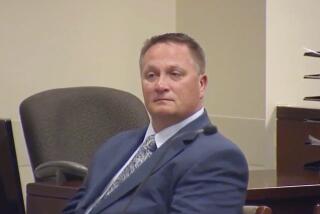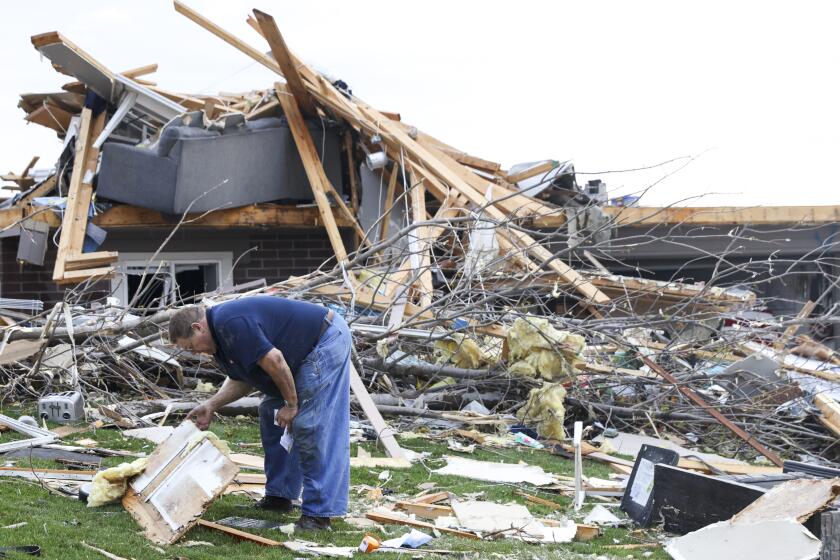Bush Says Early Iraq Troop Cuts Unlikely
President Bush said Thursday that the formation of a new government in Iraq marked a turning point for the war-torn country, but not one that would allow for an earlier drawdown of U.S. and coalition forces.
After a White House meeting with British Prime Minister Tony Blair, Bush repeated his position that he would order a reduction in forces only after military commanders told him that the country could be defended by the growing Iraqi military and police forces.
“The American people need to know that we’ll keep the forces there necessary to win,” Bush told an evening news conference. “It’s important for the American people to know that politics isn’t going to make the decision as to the size of our force level.”
He dismissed reports that the administration intended to reduce the number of troops in Iraq to 100,000 from 131,000 by year’s end as no more than “speculation in the press.”
The meeting of the two wartime allies had given rise to hope that they might signal the beginning of a troop drawdown long sought on both sides of the Atlantic. But the leaders instead indicated that they still saw huge risks for Iraq, where a Sunni Arab-driven insurgency rages on and sectarian violence between Sunni and Shiite Muslims is on the rise.
Bush said his commanders would recommend only a troop reduction “based on conditions on the ground.”
“I know I keep saying that,” he said. “And it probably bores you that I keep giving you the same answer. But I haven’t changed my opinion.”
Blair suggested that the leaders might make no decision on troop levels for several months while they waited to see how effectively Iraqi forces stood up to their attackers.
“You will find probably, over the next few months, there will be a real attempt by the anti-democratic forces to test them very, very strongly,” Blair said, responding to a question about potential troop withdrawals.
Iraq’s new leader, Prime Minister Nouri Maliki, said this week that he wanted Iraqi troops to take over responsibility for the nation’s security as soon as possible. Maliki said he believed Iraqis could assume a lead role by the end of 2007.
Blair cast some skepticism on Maliki’s prediction, saying it was possible, but insisting that Iraqi control was contingent on the new government quickly establishing a strong grip on the country, and on the ability of the Iraqi troops to crack down on insurgents.
A decision to maintain troop levels at their current size may be unwelcome news for Republicans, who face midterm elections in November with their party’s poll numbers sagging. Delaying the decision on troop withdrawals also poses difficulty for Bush and Blair, whose political fortunes have been badly damaged by the war.
The meeting of the two weakened leaders drew ridicule from some parts of the British press; the Economist magazine referred to the pair as an “axis of feeble.” Blair is expected to leave office by next summer and is widely viewed as a lame duck. Some observers have noted that this visit could be Blair’s last to the White House as prime minister.
Bush and Blair were asked pointedly about “missteps and mistakes” that they most regretted during the war.
Bush said he considered the Abu Ghraib prison abuses to be the biggest U.S. mistake in Iraq. “We’ve been paying for that for a long time,” he said.
The president also said he regretted some of his own “tough talk,” including the very phraseology that initially endeared him to Americans after the Sept. 11 terrorist attacks. He said he regretted responding to early reports of the rising Iraqi insurgency by saying, “Bring it on.” He also lamented his use of the phrase “dead or alive” in describing how he would one day capture Osama bin Laden and others. Bush has mentioned those regrets before.
For his part, Blair said the expulsion of members of Saddam Hussein’s Baath Party from the Iraqi government could have been handled better. Many people argue that expelling low- and mid-level party members alienated Sunni Arabs and fueled the insurgency.
Bush has in the past derided opponents of the war as isolationists, but he was more conciliatory Thursday. “No question that the Iraq war has, you know, created a sense of consternation here in America,” he said.
But even with surveys showing greater support for a withdrawal or reduction in the number of U.S. troops in Iraq, Bush said that most Americans would not support pulling out.
Military commanders and other U.S. officials have said privately that they hope for a substantial troop withdrawal this year. Some suggested that the U.S. troop level could drop to about 100,000 by year’s end.
But in recent months, as sectarian divisions have become more deadly, such talk has appeared to subside.
Blair, who met with Army Gen. George W. Casey, commander of U.S. forces in Iraq, during a surprise visit to Baghdad this week, said commanders were concerned that the new Iraqi government could face a surge in violence as Iraqi forces began to take over more territory from U.S., British and other coalition troops.
Secretary of Defense Donald H. Rumsfeld said this month that he expected a recommendation on troop levels from Casey once Maliki’s government was in place. However, Bush said Casey was awaiting the installation of a new Iraqi defense minister, who has yet to be selected. The president said any reductions might not come until the new ministry had developed capabilities “to enable the Iraqis to take more of the fight.”
Times staff writers Peter Spiegel, Julian E. Barnes and Peter Wallsten in Washington contributed to this report.
More to Read
Start your day right
Sign up for Essential California for news, features and recommendations from the L.A. Times and beyond in your inbox six days a week.
You may occasionally receive promotional content from the Los Angeles Times.







